Khankendi on the path of modernisation Azerbaijan’s post-liberation revival
For the fifth consecutive year, Azerbaijan has been implementing a large-scale program to revive the territories liberated from occupation in the Karabakh and East Zangezur economic regions.
In particular, high-paced restoration work is underway in the city of Khankendi, where just yesterday the President of Azerbaijan, Ilham Aliyev, took part in the opening ceremonies of a business centre and a congress centre, the foundation laying of the Khankendi railway and bus station complex, and the opening of the Ahmadbayli – Fuzuli – Shusha road. The president also inspected the ongoing work in Victory Park and visited the Azerbaijani-Uzbek joint venture — the Businesstex JV sewing factory.
The key objective of the “I State Program of the Great Return to the Territories of Azerbaijan Liberated from Occupation” was defined as the restoration of Azerbaijani cities and villages, construction of housing and social facilities, as well as transport, energy, and utility infrastructure, the commissioning of industrial clusters, trade, service, and tourism enterprises. All of this contributes to creating new jobs to facilitate the swift return of former internally displaced persons to these lands. The priority of these goals is confirmed by the scale of investments in the restoration of the Karabakh and East Zangezur economic regions. Recently, Azerbaijani Prime Minister Ali Asadov noted that for these purposes, 18 billion manats ($10.5 billion) were allocated from the state budget for 2021–2024, with an additional 4 billion manats ($2.3 billion) to be invested this year.
In this regard, the rapid pace of revival in the largest population centre of the Karabakh region — the city of Khankendi — is particularly telling. Founded in the late 18th century as a retreat for the Khans of Karabakh, located just 10 kilometres from the khanate's capital, the city of Shusha, and at the crossroads linking it to other key cities and villages of the region, Khankendi is now regaining its status as a major cultural and industrial hub. Restoration efforts in Khankendi began relatively recently, following the one-day anti-terror operation carried out by the Azerbaijani Army in September 2023, which resulted in the full restoration of Azerbaijan’s sovereignty.
In a short span of time, extensive reconstruction has been undertaken in the residential sector of Khankendi; social and administrative buildings have been restored, and the municipal infrastructure is undergoing modernisation. In particular, a fundamental overhaul of the city’s outdated power supply system is underway: since early 2025, a ring power supply scheme has been under development in Khankendi, connecting two 110-kilovolt substations as well as 35 kV distribution networks, also covering the nearby city of Khojaly.
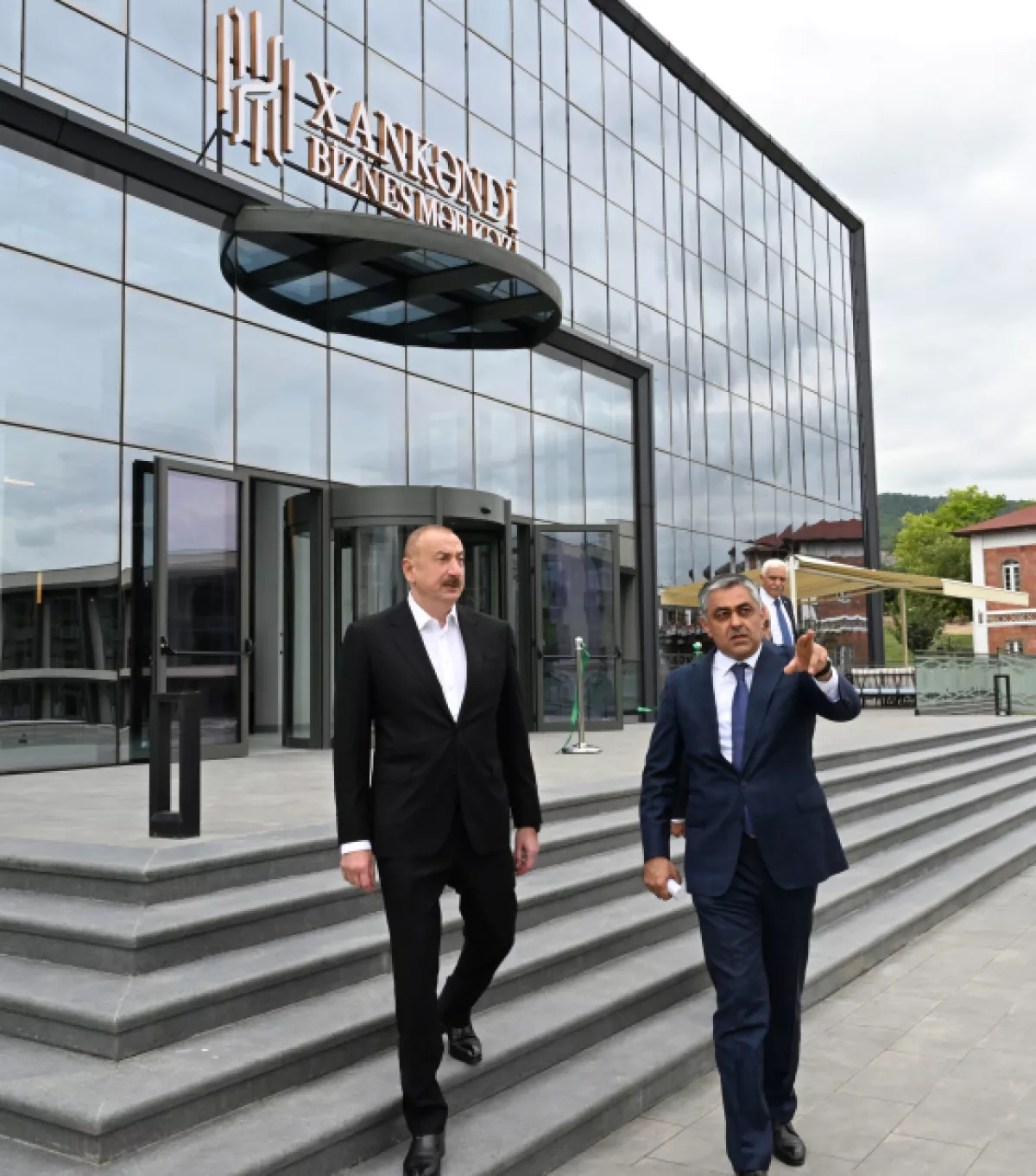
In recent months, several key facilities in Khankendi have been put into operation following major renovations, including a nursery-kindergarten, a school, medical institutions, and retail establishments. The Karabakh University and a student dormitory have been opened, the Bulud Hotel has resumed welcoming guests after restoration, and the foundations of several other important facilities have been laid.
This large-scale effort continues to accelerate. Just recently, during his visit to the Karabakh region, President of Azerbaijan Ilham Aliyev participated in the opening of the “Khankendi” Business Centre, which is part of the hotel complex bearing the same name. The four-storey business centre, with a total area of over 4,500 square metres, includes 24 office spaces, 6 meeting rooms, the 120-seat Zefir Café & Terrace restaurant, several shops, a dry cleaner, and a laundry. The Khankendi Business Centre will offer a modern and comfortable environment for resident companies; at the initial stage, it will employ 20 people, 12 of whom are residents of the liberated cities of Khankendi, Khojaly, Shusha, and others.
On the same day, the head of state also took part in the opening of the Khankendi Congress Centre. The 6,500-square-metre facility features a 600-seat auditorium, a 350-seat banquet hall, conference rooms, and various other multi-purpose spaces. The building, which harmoniously blends modern design with national architectural traditions, is intended to host congresses, conferences, seminars, business meetings, and other events of both national and international significance.
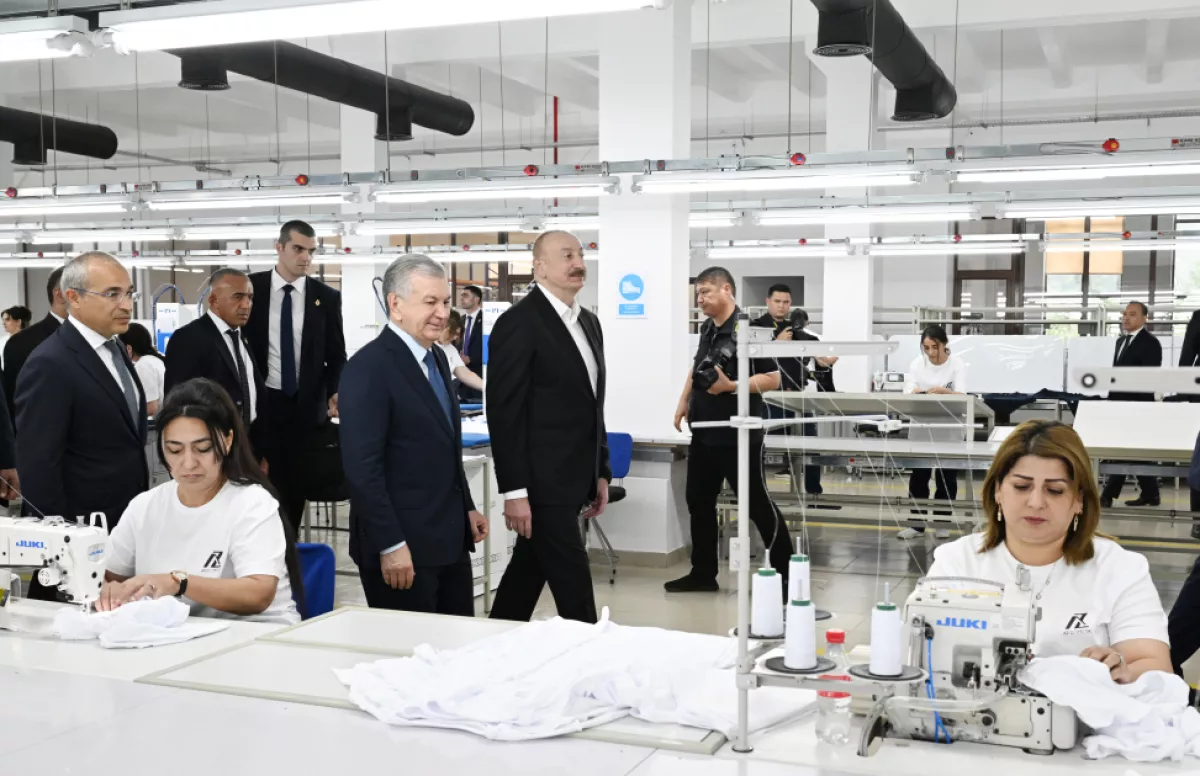
Notably, the restoration of Khankendi is being carried out with a view to developing the city into a production cluster. Just recently, the presidents of Azerbaijan and Uzbekistan — Ilham Aliyev and Shavkat Mirziyoyev, who arrived in the country on a state visit — visited the newly constructed Azerbaijani-Uzbek joint venture in the city: the Businesstex JV garment factory. The factory produces 150 models of men’s, 300 models of women’s, and 150 models of children’s clothing made from various types of fabric. Up to 2,500 knitwear items are manufactured daily, with plans to increase capacity to 10,000 units per day.
Approximately 80% of the factory’s output is intended for export to both nearby and distant international markets. Employing 250 people, Businesstex JV has become a symbol of successful Azerbaijani-Uzbek cooperation. Over the past two to three years, the two Turkic nations have stepped up joint initiatives in agriculture — particularly in cotton growing, silk production, raw material processing, and the textile industry.
Given Khankendi’s future industrial potential, closely linked to the Aghdam-Khojaly agglomeration, efforts have been fast-tracked to develop road and railway infrastructure tailored to future cargo transportation needs — both within the region and at the international level. In line with the Presidential decree dated 24 November 2020, a 47.1-kilometre railway line has been constructed from Barda to Aghdam, with an estimated annual freight turnover projected at 1.5 million tonnes.
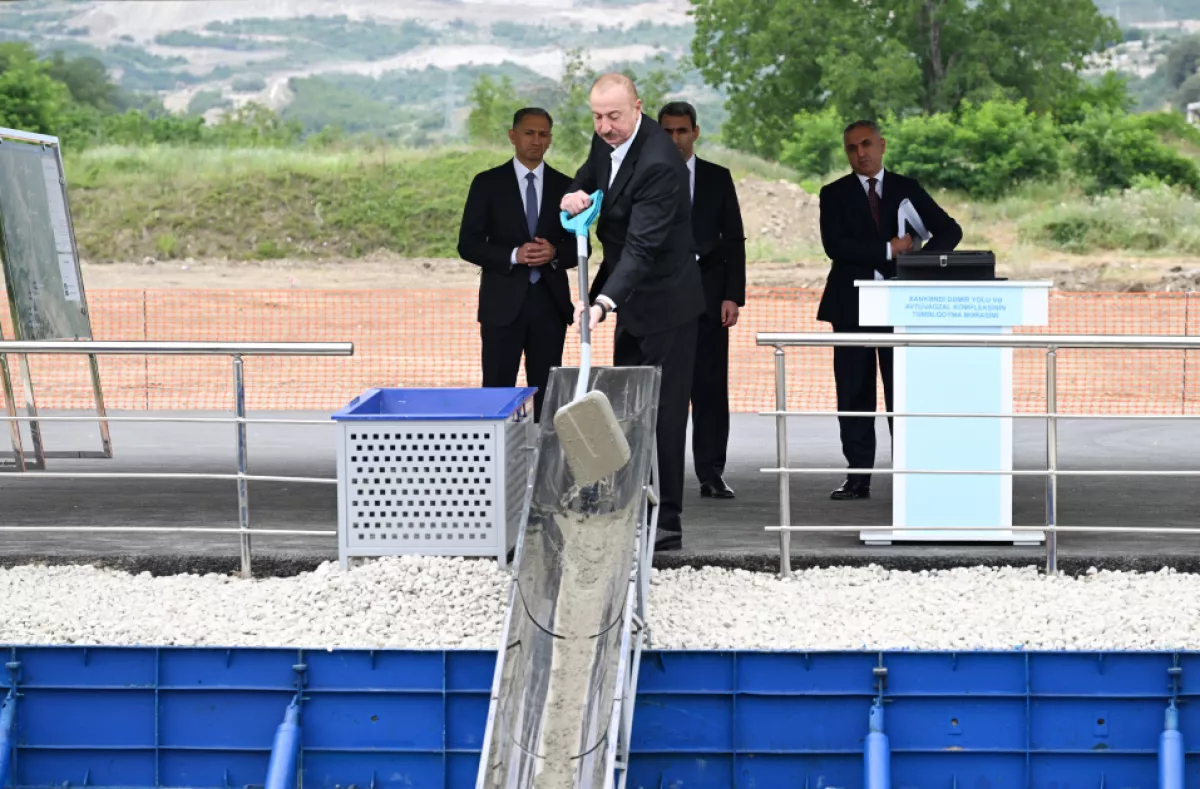
The next phase will be the construction of the Aghdam–Khojaly–Khankendi railway line, stretching 28 kilometres, with access tracks extending the total length to 34.7 kilometres. The design work for the Aghdam–Khankendi railway line—including 4 bridges, 5 overpasses, 3 pedestrian crossings, and 2 culverts—has already been completed, with implementation planned for 2025–2026.
Notably, on July 3, the head of state participated in the foundation-laying ceremony for the Khankendi railway and bus station complex, whose design is currently underway. The railway section of the complex is designed to serve 800–1000 passengers daily, while the bus station will handle 1,000–1,200 passengers per day. The 6.4-hectare complex will include two railway platforms and 12 bus stops, as well as a five-storey building housing a waiting hall, ticket offices, a medical point, a mother-and-child room, a children’s entertainment centre, shops, restaurants, administrative offices, and more.
On the same day, the President of Azerbaijan also took part in the opening of the 81.7-kilometre Ahmadbayli–Fuzuli–Shusha road. Notably, the new road shortens the distance by 19.3 kilometres. The first 48 kilometres of this six-lane highway meet the highest (first) technical category, while the remaining 33.7 kilometres will be four lanes. This project is very important for diversifying the internal road network of the Karabakh region. The highway also forms a key part of international transport corridors crossing Azerbaijan, and over time it will make a significant contribution to the development of tourism.
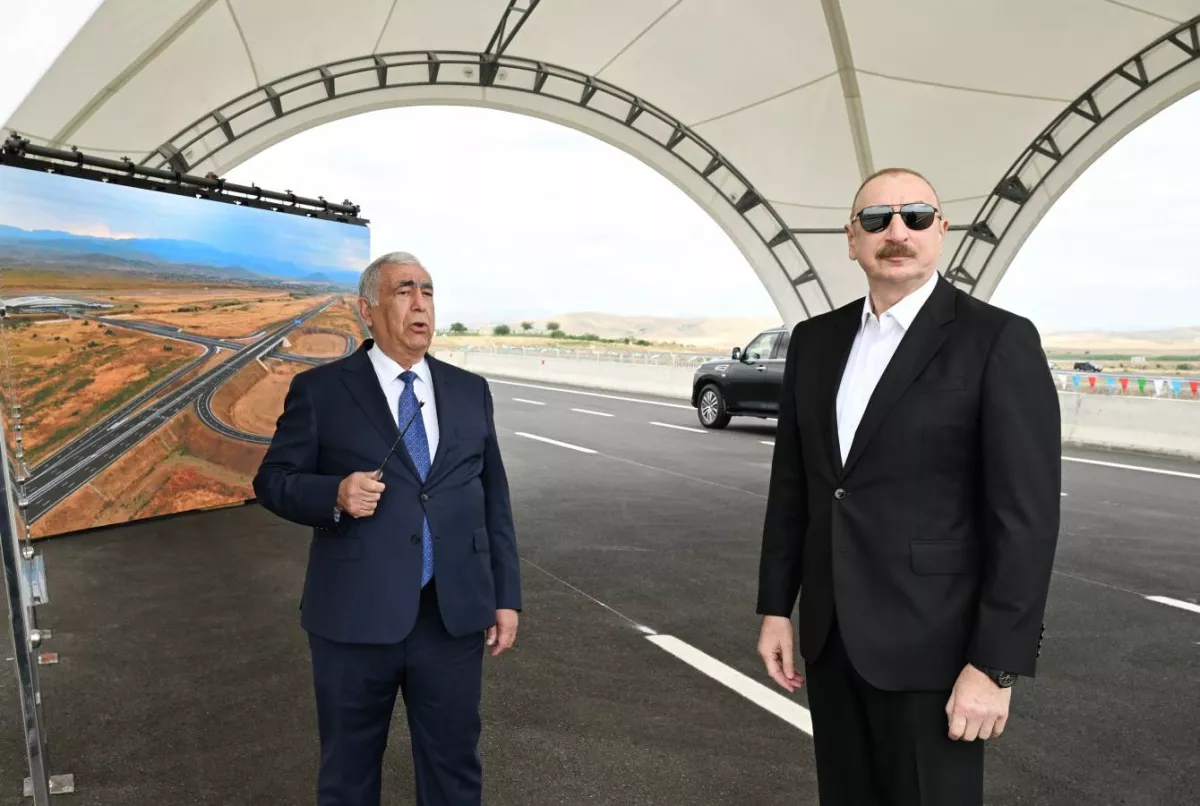
The picturesque mountain landscapes and cultural monuments of the Karabakh gem—the city of Shusha—as well as the nearby city of Khankendi, are recognised as having high potential for the development of tourist destinations. During his visit, President Ilham Aliyev inspected the site selected for the construction of the Khankendi–Shusha cable car. It was noted that the total length of the cable car will be approximately 6 kilometres, with the trip lasting about 13 minutes at a speed of 8 metres per second.
The implementation of this project is expected to give a strong boost to tourism development while also providing comfortable transportation for residents travelling between Khankendi and Shusha.
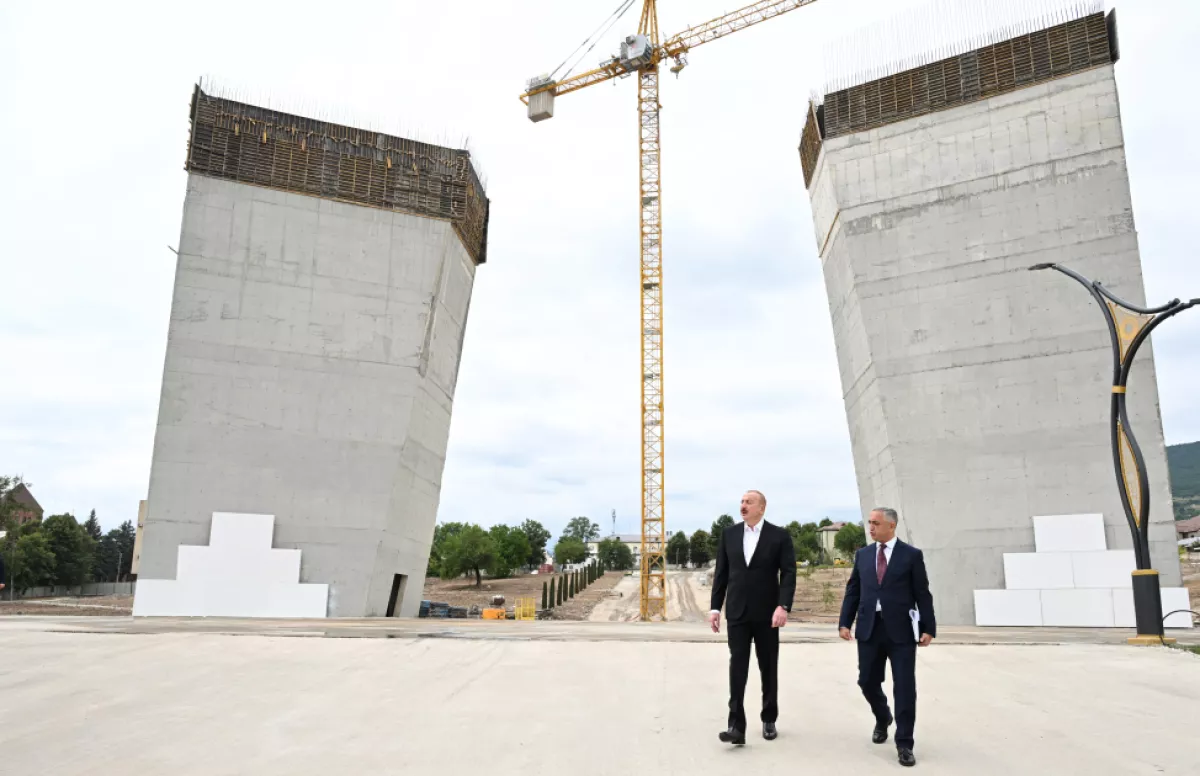
The Victory Park being constructed in Khankendi was founded by the head of state in February of this year, also holds significant cultural importance. Recently, President Ilham Aliyev reviewed the progress of construction at the 8.3-hectare park, where the Triumphal Arch—a symbol of Azerbaijan’s Victory—is being built. The arch will stand 44 metres tall, corresponding to the number of days in the Patriotic War. At the top of the arch, an observation deck equipped with elevators will be created for visitors. The park is also undergoing landscaping, with 300 new trees and over nine thousand decorative shrubs of various species planted.








